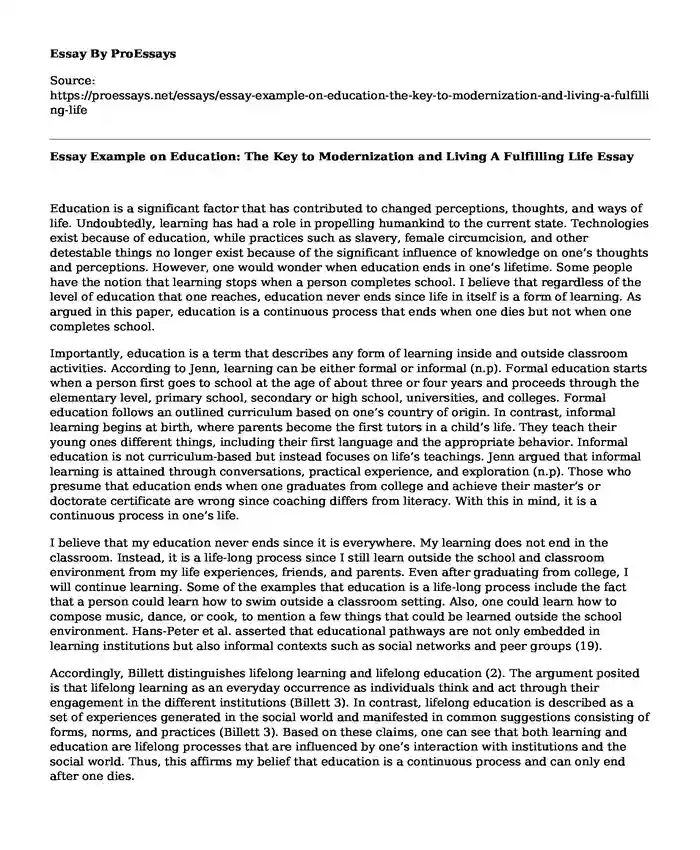Education is a significant factor that has contributed to changed perceptions, thoughts, and ways of life. Undoubtedly, learning has had a role in propelling humankind to the current state. Technologies exist because of education, while practices such as slavery, female circumcision, and other detestable things no longer exist because of the significant influence of knowledge on one’s thoughts and perceptions. However, one would wonder when education ends in one’s lifetime. Some people have the notion that learning stops when a person completes school. I believe that regardless of the level of education that one reaches, education never ends since life in itself is a form of learning. As argued in this paper, education is a continuous process that ends when one dies but not when one completes school.
Importantly, education is a term that describes any form of learning inside and outside classroom activities. According to Jenn, learning can be either formal or informal (n.p). Formal education starts when a person first goes to school at the age of about three or four years and proceeds through the elementary level, primary school, secondary or high school, universities, and colleges. Formal education follows an outlined curriculum based on one’s country of origin. In contrast, informal learning begins at birth, where parents become the first tutors in a child’s life. They teach their young ones different things, including their first language and the appropriate behavior. Informal education is not curriculum-based but instead focuses on life’s teachings. Jenn argued that informal learning is attained through conversations, practical experience, and exploration (n.p). Those who presume that education ends when one graduates from college and achieve their master’s or doctorate certificate are wrong since coaching differs from literacy. With this in mind, it is a continuous process in one’s life.
I believe that my education never ends since it is everywhere. My learning does not end in the classroom. Instead, it is a life-long process since I still learn outside the school and classroom environment from my life experiences, friends, and parents. Even after graduating from college, I will continue learning. Some of the examples that education is a life-long process include the fact that a person could learn how to swim outside a classroom setting. Also, one could learn how to compose music, dance, or cook, to mention a few things that could be learned outside the school environment. Hans-Peter et al. asserted that educational pathways are not only embedded in learning institutions but also informal contexts such as social networks and peer groups (19).
Accordingly, Billett distinguishes lifelong learning and lifelong education (2). The argument posited is that lifelong learning as an everyday occurrence as individuals think and act through their engagement in the different institutions (Billett 3). In contrast, lifelong education is described as a set of experiences generated in the social world and manifested in common suggestions consisting of forms, norms, and practices (Billett 3). Based on these claims, one can see that both learning and education are lifelong processes that are influenced by one’s interaction with institutions and the social world. Thus, this affirms my belief that education is a continuous process and can only end after one dies.
Conclusion
To conclude, education does not end in one’s life. Instead, knowledge and the learning process proceeds even after one gets their bachelor’s, master’s, or doctorate certificates. Education can be either informal or formal, where formal education occurs in school settings while one’s interactions with the environment influence informal learning. People interact with the situation on a day-to-day basis, which proves the argument that education never ends.
Works Cited
Billett, Stephen. “Distinguishing lifelong learning from lifelong education.” Journal of Adult Learning, Knowledge and Innovation, vol. 2, no. 1, Mar. 2018, pp. 1–7, doi: 10.1556/2059.01.2017.3.Hans-Peter, Blossfeld and Maurice, Jutta. “2 Education as a lifelong process.” Zeitschrift Für Erziehungswissenschaft, vol. 14, no. S2, May 2011, pp. 19–34, doi: 10.1007/s11618-011-0179-2.
Jenn. Does Education Ever Stop or Does It Continue Throughout One’s Entire Lifetime? January, 10, 2019, https://therebelchick.com/does-education-ever-stop-or-does-it-continue-throughout-ones-entire-lifetime/
Cite this page
Essay Example on Education: The Key to Modernization and Living A Fulfilling Life. (2023, Sep 10). Retrieved from https://proessays.net/essays/essay-example-on-education-the-key-to-modernization-and-living-a-fulfilling-life
If you are the original author of this essay and no longer wish to have it published on the ProEssays website, please click below to request its removal:
- Essay Sample on Work Place Stress Management in Healthcare
- Child Development: Importance of Reading to Children at an Early Age Essay
- Research Paper on Mental Healthcare
- Paper Example on Mental Health and Social Issues
- Essay on High-Quality Early Childhood Education Program
- Essay Example on Living in 21st Century: Stress, Resilience, & Transitions
- Essay Example on John and Mary's Happy Ending: Love, Marriage, Family, and Death







